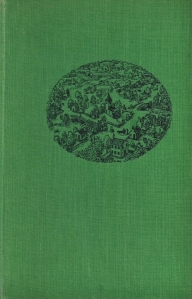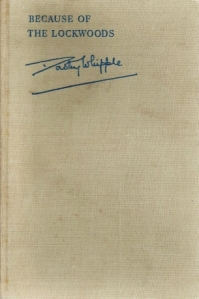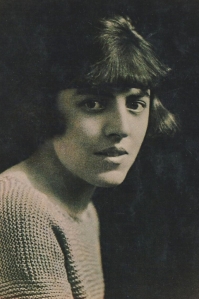They Were Sisters by Dorothy Whipple ~ 1943. This edition: Persephone Books, 2020. Afterword by Celia Brayfield. Softcover. 455 pages.
 Three sisters, three marriages.
Three sisters, three marriages.
Dorothy Whipple’s novels of fraught family dynamics are compellingly readable, and this one ramps things up a notch over the others; there is some really dark stuff going on here, including but not limited to psychological spousal and child abuse.
Sounds depressing, doesn’t it?
It is, very much so, though it’s so fascinating in its depictions that one cannot ever quite look away.
It is also a story built around the power of love, and, yes, sometimes the powerlessness of love to “make things better” for the loved ones.
In the years before the Great War, three sisters in a middle-class English family lose their mother too soon. Responsible, highly intelligent, seventeen-year-old Lucy leaves her studies – she’s been preparing for Oxford – and takes on the role of mother-figure to her three brothers and two younger sisters, the sweet natured, trusting thirteen-year-old Charlotte, and the headstrong, volatile and exceptionally beautiful eleven-year-old Vera.
The brothers gain independence swiftly, but the young sisters remain on Lucy’s conscience and in her care; she often feels that there is a great divide between them, the too-soon sedate older sister sometimes cut out of confidences by the younger pair. But by and large things go on quite serenely, until the inevitable heart-stirrings of young love strike.
Lucy, “the plain one”, seated among the chaperones at parties and dances, is rather on the shelf, but Charlotte and Vera are very much sought after, and all three sisters ultimately marry. Charlotte to the self-satisfied, go-getter businessman Geoffrey, one of Vera’s cast-offs, Vera to the self-effacing and wealthy Brian, and Lucy to sedate, much older William, whose keen eyes have noted quiet Lucy’s sterling qualities.
As the years go by, these pairings develop in three vastly differing ways. Charlotte and Vera have children; to her quiet grief Lucy is childless; but they keep in touch as the years march on and Lucy remains watchful over her two sisters and then her nieces and nephew, becoming the perpetual aunt, hosting the children on holidays, and trying hard to not interfere when she sees her sisters making some very poor decisions, some deliberate, some thrust upon them by the situations they find themselves in.
Moral failure or spiritual failure or whatever you call it, makes such a vicious circle… It seems as if when we love people and they fall short, we retaliate by falling shorter ourselves. Children are like that. Adults have a fearful responsibility. When they fail to live up to what children expect of them, the children give up themselves. So each generation keeps failing the next.
Geoffrey, to no one’s surprise but Charlotte’s, proves to be a manipulatively cruel domestic tyrant of epic proportions. Brian, despite holding the purse strings in the marriage, is relegated to shadow-husband as Vera fervently pursues self indulgence. William watches it all with a keen eye and hands-off demeanor, giving quiet support to Lucy as she frets over the troubles she finds Charlotte and Vera enmeshed in.
This is as much plot as we are given; it’s very much a novel about relationships versus large happenings. There are dramatic events, but they are of a small, familial nature, kept as much under the rug as possible due to the need to keep up appearances.
When two of the sisters’ marriages go inevitably wrong, the third one quietly carries on, allowing a small semblance of normalcy for some of the damaged children who are ultimately the innocent victims, the collateral damage of their elders’ decisions and actions.
An intense, unputdownable read. Dorothy Whipple, accomplished documentarian of domestic drama, excels herself here.
My rating: 9/10
From the Persephone Books website:
‘They Were Sisters is a compulsively readable but often harrowing novel by one of Persephone’s best writers, who always manages to make the ordinary extraordinary,’ writes Celia Brayfield. This, the fourth Dorothy Whipple novel we have republished, is, like the others, apparently gentle but has a very strong theme, in this case domestic violence. Three sisters marry very different men and the choices they make determine whether they will flourish, be tamed or be repressed. Lucy’s husband is her beloved companion; Vera’s husband bores her and she turns elsewhere; and Charlotte’s husband is a bully who turns a high-spirited naive young girl into a deeply unhappy woman.
In the Independent on Sunday Charlie Lee-Potter commented that They Were Sisters ‘exerts a menacing tone from start to finish. I eavesdropped on the lives of Lucy, Charlotte and Vera, compelled to go on but with a sense of simmering dread.’ Salley Vickers in the Spectator described ‘the sparkling achievements of this accomplished novelist, not the least of which is the ability – rarer today than it should be – simply to entertain.’ And Elizabeth Day has called it ‘a powerful portrayal of sisterly relationships and an emotionally coercive marriage.’
They Were Sisters was made into a movie in 1945, starring James Mason as the suavely malignant Geoffrey, and Phyllis Calvert as his abused wife. Movie version described in some detail here. The plot appears to have been altered somewhat, but the essentials of the novel appear to remain true to Whipple’s written version.






















